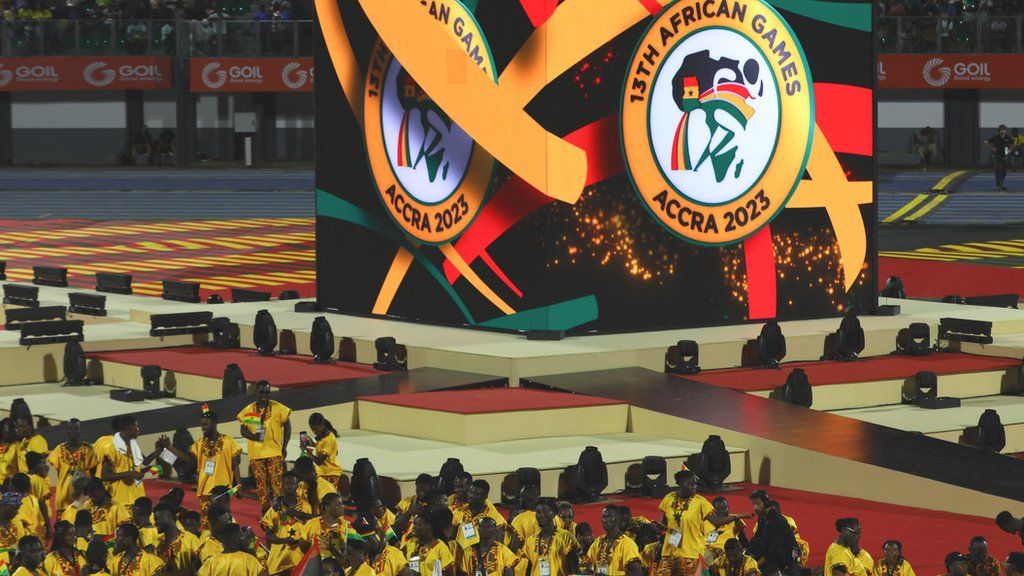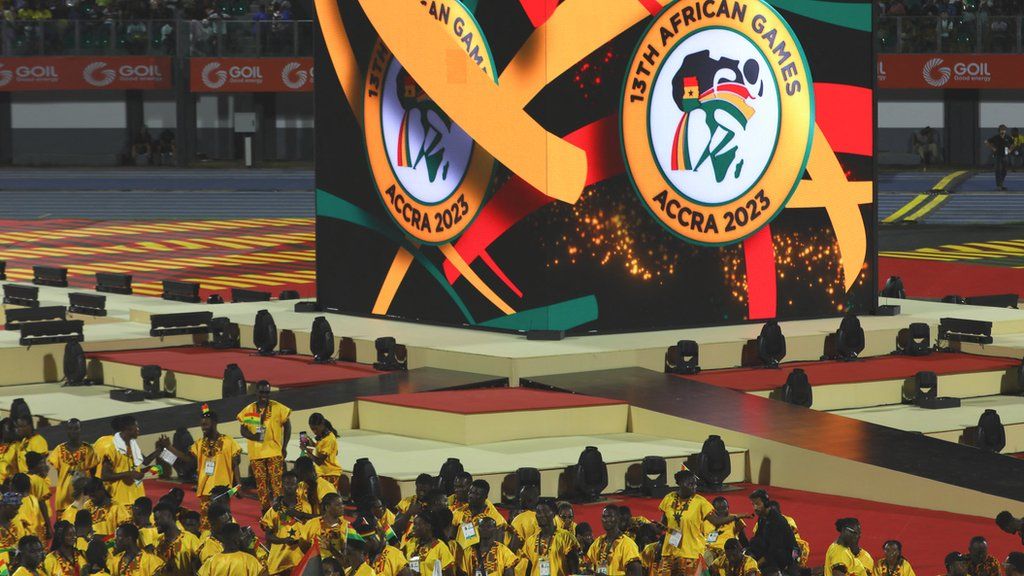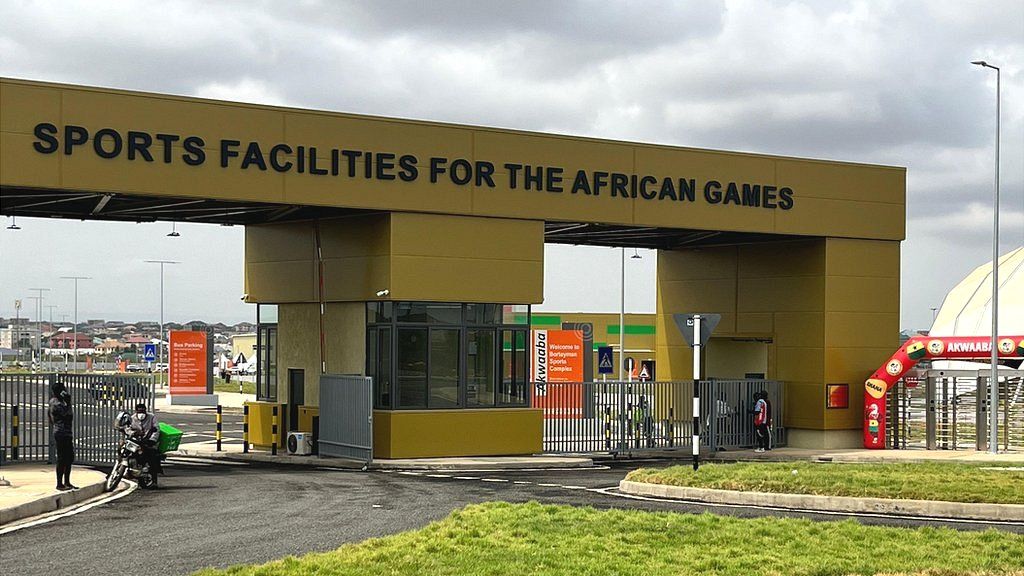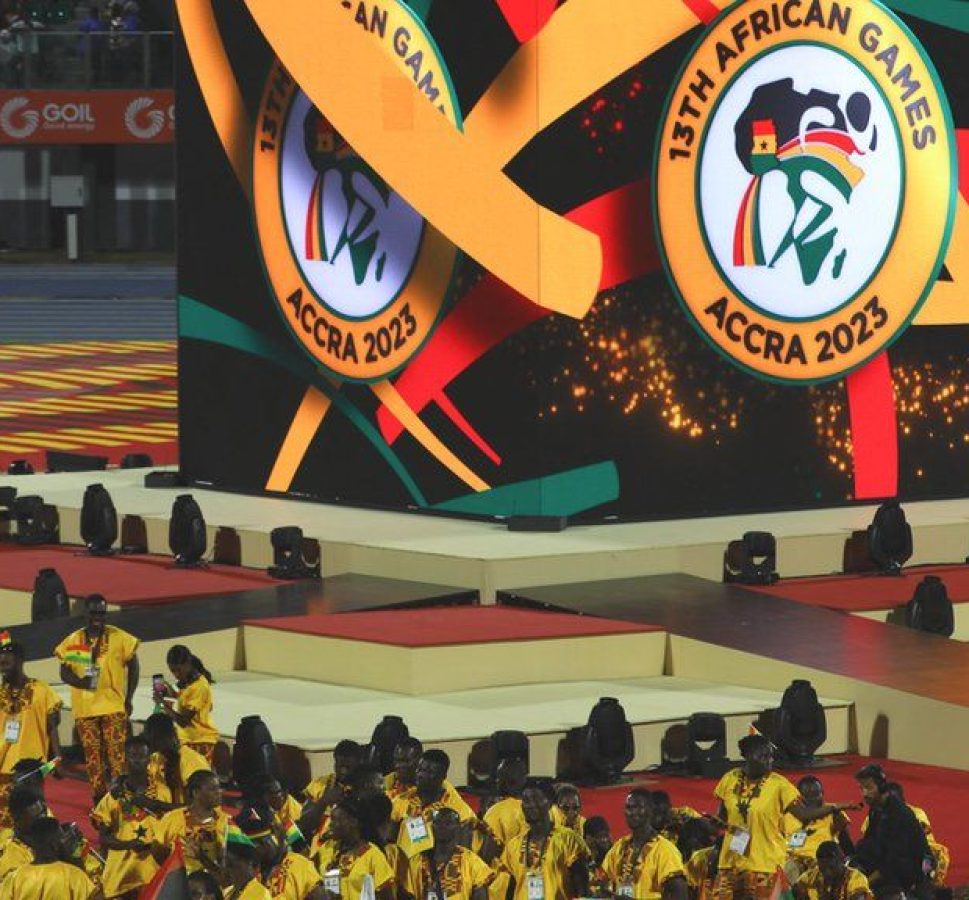
The 13th African Games are in full swing in Ghana, but the high cost of hosting the event amid a time of economic turmoil has brought scrutiny.
An outlay of almost $250m (£195.2m) has been committed on the multi-sport event, with government opposition declaring it a “misplaced priority” for a nation which is heavily indebted, enduring high rates of inflation and suffering the effects of the regional cost of living crisis.
“I really don’t think we have our priorities right as a nation,” opposition MP Samuel Okudzeto Ablakwa told BBC Sport Africa.
“We have been declared insolvent, bankrupt and downgraded by all sovereign rating agencies, with a junk status.
“This government has a penchant for big spending [on] things that really are not [a] priority.”
However, Ghana’s President Nana Akufo-Addo says the legacy of hosting the Games will far outlive the economic troubles the country is experiencing.
“It has taken a lot of courage to persist with the decision to host the Games and I’m glad we went ahead,” President Akufo-Addo said during the opening ceremony in Accra last Friday.
“We can be proud of the massive sporting infrastructure we have put in place for the Games, which would be a huge legacy for our country.”
The Games were originally scheduled to take place in August last year but were rescheduled to this month because of a disagreement over marketing rights which delayed the completion of facilities.
Yet the event, which features more than 5,000 athletes and officials from across the continent competing in 29 disciplines, did not get off to the most auspicious start.
There were four power outages with the first three days of competition, including during Ghana’s opening game of the women’s football event against Ethiopia at the Cape Coast Stadium and a blackout at the athletes’ village.
The first beach volleyball match was delayed by 35 minutes as no nets had been installed, and it was reported that Ghana’s cycling team had to buy new bikes.
Are the African Games worth it?

One of Ghana’s biggest investments has been the Borteyman Sports Complex, constructed at a cost of $145m (£113.2m).
A further $34m (£26.5m) was spent to upgrade the University of Ghana Stadium and $16m (£12.5m) was used to renovate the athletes’ village, while $48m (37.5m) is being used by organisers to run the 16-day event.
The timing of the Games means just eight sports – athletics, badminton, cycling, swimming, table tennis, tennis, triathlon and wrestling – are using it as qualifiers for the 2024 Olympics and a number of prominent African competitors have chosen not to attend.
And there was not much publicity of the Games in Accra ahead of the opening ceremony.
“The awareness is a bit slow,” Fred Kwabena, who sells a variety of national team merchandise at the Osu Junction in the capital, said.
“The poor performance of the Black Stars at the Africa Cup of Nations has not helped. Many people are still disappointed.”
Yaw Asare, who works as a cab driver in the city, says not many Ghanaians are excited about the Games, which comes at a time of serious economic anxiety.
Inflation reached over 40% last year but has since dropped to around 23%.
“We need food on our tables, not stadiums. Our leaders should care more about us,” he said.
Hosting the Games could have wider-ranging implications when Ghanaians head to the ballot box in December to vote in general elections for members of parliament and a new President, with the incumbent Akufo-Addo ineligible to run again.
His deputy Mahamudu Bawumia, who supervised plans for the African Games, is the candidate of the ruling New Patriotic Party (NPP), while former President John Mahama will lead the National Democratic Congress at the polls.
Will Ghana’s economy be boosted?
Having to commit so much to improve infrastructure has led to an alarmingly high spend on staging the Games, according to Lord Mensah, a professor of economics at the University of Ghana.
“If your economy is not doing well, like Ghana, you will be in trouble,” Prof Mensah told BBC Sport Africa.
“If you don’t have much infrastructure to absorb the number of people coming in you will end up starting from scratch, which costs a lot of money.”
Mustapha Ussif, the country’s minister of youth and sport, said “there is no perfect time” to host the Games, but that it could provide a boost to the country.
“What we spent went through all the rigorous procurement process, got cabinet approval and parliament did their scrutiny,” he said.
“It is even during these difficult times that sport can be used to relieve the stress experienced during (the) Covid [pandemic].”
Opposition MP Ablakwa, however, countered that the initial costs approved by parliament were far exceeded.
As part of its efforts to regain macroeconomic stability, Ghana obtained a three-year credit facility of approximately $3bn (£2.34bn) from the International Monetary Fund last year, with the country initiating a thorough debt restructuring process.
Professor Mensah warns that the investment on the African Games may not have a positive impact on Ghana’s ailing economy despite a hoped-for upturn in the hospitality sector.
“Costs are often inflated and that limits the economic benefits,” he said.
“The athletes coming do not really have the huge spending power to match the level of investment made. But if the infrastructure is properly maintained, the long-term benefits will outlive the current spending.”
Driving sports tourism in Ghana

After its outlay on hosting the African Games, Ghana is hoping to emulate Morocco and become a regional sport hub in West Africa.
The aim is to attract local and international federations to camp in the country ahead of continental and global competitions, and potentially host other sporting events.
The Borteyman Sports Complex now boasts international-standard tennis and badminton courts, an aquatics venue with a 10-lane swimming pool and a multi-purpose hall for indoor events.
It also has a temporary 500-seater dome, a six-lane athletics warm-up track and a Fifa-standard training pitch.
“What is unique about the facilities we have provided is that they’ve all got certifications from world federations,” Ussif told BBC Sport Africa.
“We now have opportunities to host regional and national events at these facilities, which will help us develop more talents.”
Ussif says there are plans for the Borteyman Sports Complex to be converted into the ‘University of Sports’ after the Games end on 23 March.
“The investment we have done is beyond the Games,” he added.
“Our plan is to drive sports tourism towards our country.”
Ghana spent $100m (£78m) on renovation and construction of facilities before hosting the Africa Cup of Nations in 2008, and the main challenge after the country’s latest multi-million dollar investment in sporting infrastructure will be one of maintenance.
“It’s not the first time we have hosted major events like this,” Ghanaian sports journalist Muftawu Abdulai said.
“Maintenance has always been our problem.
“If we can maintain these facilities, then the benefits will really come to Ghanaian sports.”






